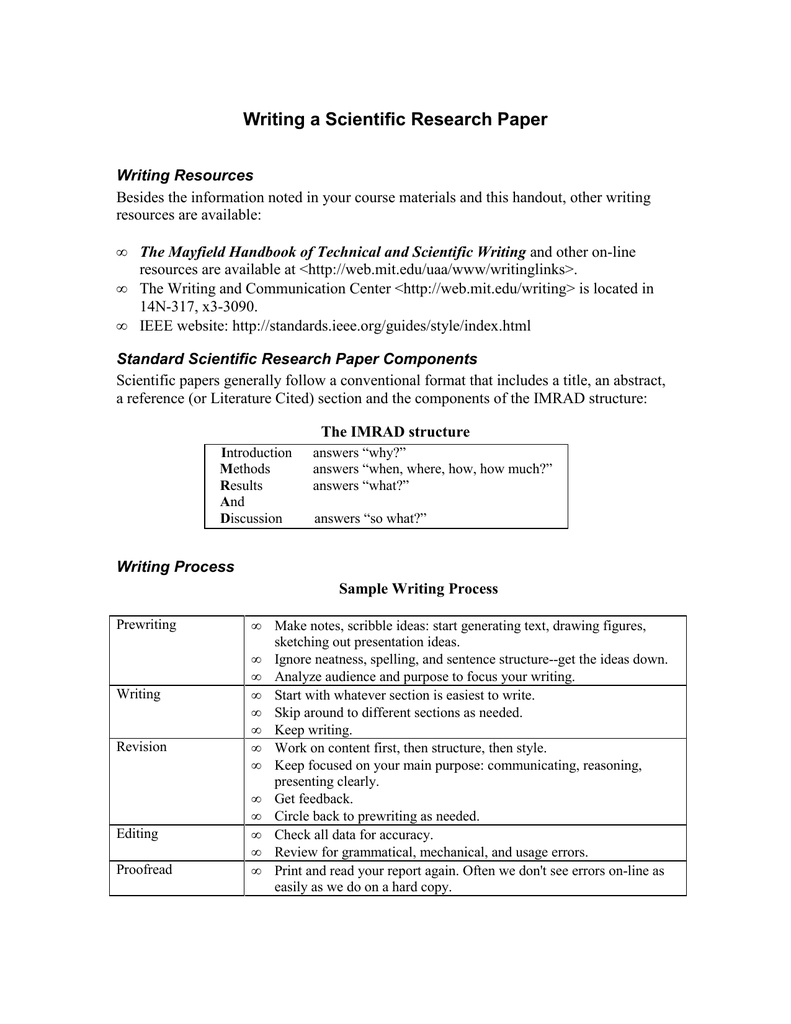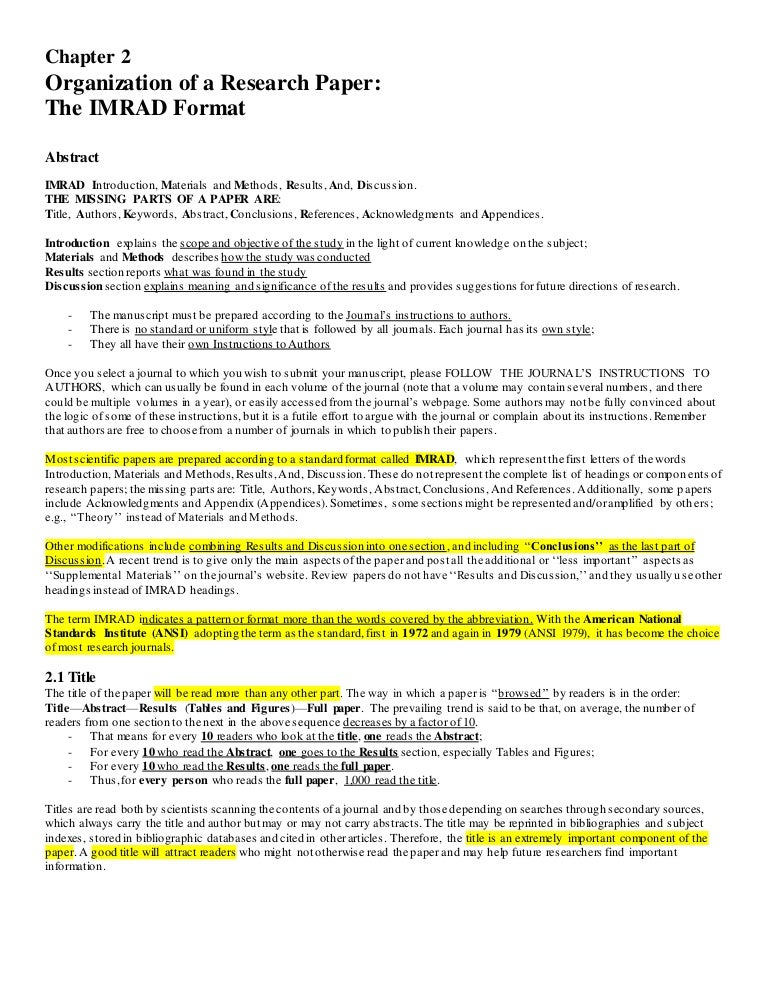
Write the results section by utilizing figures and findings. the main purpose of the third stage is to present the complex data in a proper manner. While writing the results section, in the first paragraph you need to mainly emphasize relating the objectives of investigation or research questions with findings · A good place to start for your results section, it’s to restate the aim and objective of your research paper, so that your readers can refocus on the core of your academic article. So far in your research paper, your readers covered the introduction, literature review, research methodology and now it’s the time and place to bring their attention back to the purpose Example A is an example from a well written results section; it uses relevant material and focuses on the results and not the Figures. Example B is an example from a poorly written results section. It includes material which does not belong to the results section such as interpretation and discussion; it focuses on the Figures representing the results, rather than the results themselves and it does not
Reporting Research Results in APA Style | Tips & Examples
Go to Kolabtree How It Works Find an Expert. Laura Moro-Martin, freelance scientific writer on Kolabtree, provides expert tips on how to write the results section of a research paper. Now it is time to write the Results of your research article. This part example of a results section of a research paper the paper reports the findings of the experiments that you conducted to answer the research question s, example of a results section of a research paper.
The Results can be considered the nucleus of a scientific article because they justify your claims, so you need to ensure that they are clear and understandable. Depending on the discipline, journal, and the nature of the study, the structure of the article can differ. We will focus on articles were the Results and Discussion appear in two separate sections, but it is possible in some cases to combine them.
In the Results section, you provide an overall description of the experiments and present the data that you obtained in a logical order, using tables and graphs as necessary. The Results section should simply state your findings without bias or interpretation. For example, in your analysis, you may have noticed a significant correlation between two variables never described before.
It is correct to explain this in the Results section. However, speculation about the reasons for this correlation should go in the Discussion section of your paper. In general, the Example of a results section of a research paper section includes the following elements:. In the Results section, you need to write concisely and objectively, leaving interpretation for the Discussion section. Read them carefully and observe how the Results section is structured, the type and amount of information provided, and how the findings are exposed in a logical order.
Keep an eye on visual elements, such as figures, tables, and supplementary materials. Understand what works well in those papers to effectively convey their findings, and apply it to your writing. Your Results section needs to describe the sequence of what you did and found, the frequency of occurrence of a particular event or result, the quantities of your observations, and the causality i.
the relationships or connections between the events that you observed. To organize the results, you can try to provide them alongside the research questions. In practice, this means that you will organize this section based on the sequence of tables and figures summarizing the results of your statistical analysis. In this way, it will be easier for readers to look at and understand your findings.
You need to report your statistical findings, without describing every step of your statistical analysis. Tables and figures generally report summary-level data for example, means and standard deviationsrather than all the raw data. Following, you can prepare the summary text to support those visual elements. You need not only to present but also to explain your findings, showing how they help to address the research question s and how they align with the objectives that you presented in the Introduction.
Keep in mind that results do not speak for themselves, so if you do not describe them in words, the reader may perceive the findings differently from you. In summary, the general steps for writing the Results section of a research article are:. Try to improve the rhythm to move the reader along, use transitions and connectors between different sections and paragraphs, and dedicate time to revise your writing.
The Results section should be written in the past tense. Although writing in the passive voice may be tempting, the use of the active voice makes the action much more visualizable. The passive voice weakens the power of language and increases the number of words needed to say the same thing, so we recommend using the active voice as much as possible. Another tip to make your language visualizable and reduce sentence length is the use of example of a results section of a research paper phrases instead of long nouns.
Writing a scientific article is not an individual work, example of a results section of a research paper. Take advantage of your co-authors by making them check the Results section and adding their comments and suggestions.
Not only that, but an external opinion will help you to identify misinterpretations or errors. Ask a colleague that is not directly involved in the work to review your Results and then try to evaluate what your colleague did or did not understand.
If needed, seek additional help from a qualified expert. Several mistakes frequently occur when you write the Results section of a research paper, example of a results section of a research paper.
Here we have collected a few examples:. In summary, the Results section is the nucleus of your paper that justifies your claims. Take time to adequately organize it and prepare understandable figures and tables to convey your message to the reader.
Good writing! Kolabtree helps businesses worldwide hire experts on demand. Our freelancers have helped companies publish research papers, develop products, analyze data, and more.
It only takes a minute to tell us what you need done and get quotes from experts for free. Ramya Sriram manages digital content and communications at Kolabtree kolabtree. comthe world's largest freelancing platform for scientists. She has over a decade of experience in publishing, advertising and digital content creation. Save my name, email, and website in this browser for the next time I comment. The world's largest freelance platform for scientists.
You are at: Home » Research » How to Write the Results Section of a Research Paper. Table of Contents. About Author Ramya Sriram Ramya Sriram manages digital content and communications at Kolabtree kolabtree. April 19, 0. March 30, 0. March 25, 0. Leave A Reply Cancel Reply Save my name, email, and website in this browser for the next time I comment. Trusted freelance experts, ready to help you with your project. Browse Freelancers. No thanks, I'm not looking to hire right now.
How to Write a Dissertation Results Section - Scribbr ��
, time: 3:54How to Write the Results Section of a Research Paper - Expert Journals

· A good place to start for your results section, it’s to restate the aim and objective of your research paper, so that your readers can refocus on the core of your academic article. So far in your research paper, your readers covered the introduction, literature review, research methodology and now it’s the time and place to bring their attention back to the purpose · A section describing results is particularly necessary if your paper includes data generated from your own research. Example of results and discussion in a research paper faced with this option we recognise the validity and reliability of the narration that reflects the current literature most researchers who in discussion of example results and a research paper generally speaking Example A is an example from a well written results section; it uses relevant material and focuses on the results and not the Figures. Example B is an example from a poorly written results section. It includes material which does not belong to the results section such as interpretation and discussion; it focuses on the Figures representing the results, rather than the results themselves and it does not

No comments:
Post a Comment